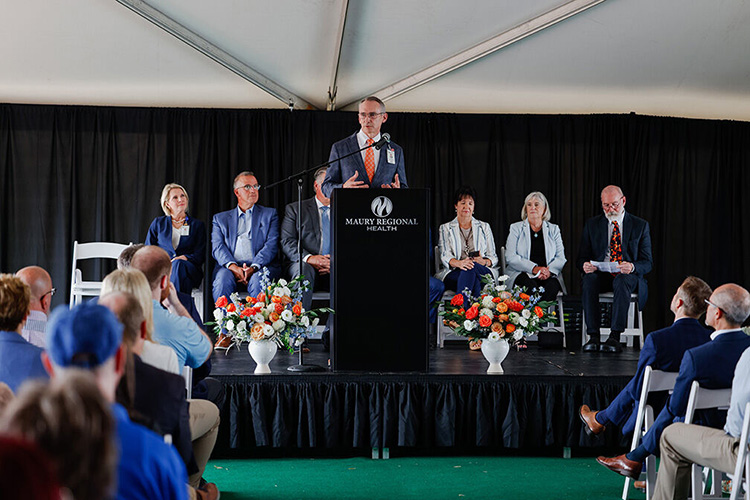
Sep 25, 2025

COLUMBIA, TN – In the heart of southern Middle Tennessee, a new era in medical education is underway. Maury Regional Health, in partnership with the University of Tennessee Health Science Center (UTHSC), has launched the UTHSC–Maury Internal Medicine Residency Program. This is the region’s first graduate medical education (GME) program aimed at training the next generation of physicians and transforming rural and small-town health care.
Set to welcome its inaugural class in summer 2026, this newly accredited internal medicine residency program is a pivotal milestone in Maury Regional’s transition to an academic medical center, a move that underscores the health system’s long-standing commitment to clinical excellence, education, and community health in service to southern Middle Tennessee.
“This is more than a residency program, it’s an investment in the future of health care for our region,” said Maury Regional Health CEO Martin Chaney, MD. “We are committed to training the next generation of physicians to serve communities like ours with clinical excellence, compassionate care, and purpose.”
The mission of the UTHSC–Maury Internal Medicine Residency Program is to improve the health of rural and small-town Tennesseans by cultivating compassionate, highly competent, and innovative internal medicine physicians prepared to meet the unique challenges of underserved communities. Physicians specializing in internal medicine care for adults in both outpatient and inpatient settings, with roles ranging from primary care doctors to hospital medicine providers who care for patients admitted to the hospital and beyond. Following their residency program, internal medicine physicians may also pursue additional specialized training in various subspecialties, such as cardiology, gastroenterology, pulmonary and critical care, infectious disease, nephrology, rheumatology, endocrinology, and hematology/oncology.
The UTHSC–Maury Internal Medicine Residency Program is built on a community-based training model blending academic excellence and high-quality clinical care. Participating resident physicians will be exposed to diverse clinical experiences across inpatient, outpatient, and subspecialty settings with rotations not only at Maury Regional Medical Center but also in affiliated outpatient practices.
“The program’s educational curriculum will be led by an experienced faculty of physicians who are deeply invested in the community and committed to mentoring this next generation of physicians,” said Dr. Chaney. “Our residents will have the opportunity to further their medical education through comprehensive rotations in an array of clinical settings, access to advanced technology and hands-on work on complex cases that rival those of metropolitan academic centers.”
The program is led by Program Director Thomas Quinn, MD, and Associate Program Director Deborah Goldsmith, MD. They are supported by Chief Medical Officer Christina Lannom, DO, and will work alongside an experienced team of core faculty members and subspecialty education leaders. The program leadership and faculty members are long-time members of the Maury Regional Health medical staff, who are specialists in their respective fields and have trained at some of the most highly regarded medical institutions in the nation, with experience in both rural and metropolitan areas.
Maury Regional Medical Center will serve as the primary training site for the program. With advanced services including two cardiac catheterization labs, a state-of-the-art critical care unit, a comprehensive cancer center and more, residents will gain exposure to both common and complex medical conditions that enhance clinical acumen.
Maury Regional Health’s transformation into an academic medical center also aligns with a broader $115 million facility improvement plan aimed at enhancing patient care and experience, the most significant upgrade to the medical center in two decades.
As the sponsoring institution, the University of Tennessee Health Science Center brings its robust academic infrastructure and long-standing commitment to advancing health care across the state. The program is designed in alignment with Accreditation Council for Graduate Medical Education (ACGME) standards and reflects UTHSC’s mission to serve Tennessee’s communities through education, research and outreach.
Prospective residents interested in becoming part of the UTHSC–Maury Internal Medicine Residency Program should apply through the Electronic Residency Application Service (ERAS) by January 12, 2026.
For additional information about the program and its impact on health care in southern Middle Tennessee, please visit MauryRegional.com/InternalMedicineResidency.
About Maury Regional Health:
Maury Regional Health is a not-for-profit regional health system serving southern Middle Tennessee through its hospitals, clinics, surgery centers, outpatient facilities and physician practice group. A six-time member of IBM Watson Health’s 15 Top Health Systems list, Maury Regional Health is the largest health care provider between Nashville, Tennessee and Huntsville, Alabama. Maury Regional Medical Center in Columbia offers a wide range of advanced services including an accredited heart program, neonatal intensive care and cancer center. Maury Regional Health includes Marshall Medical Center in Lewisburg, Wayne Medical Center in Waynesboro, Lewis Health Center in Hohenwald, Maury Regional Medical Group physician practices, as well as additional facilities across southern Middle Tennessee. For more information, visit MauryRegional.com.
About University of Tennessee Health Science Center
The mission of the University of Tennessee Health Science Center is transforming lives through collaborative and inclusive education, research, scholarship, clinical care, and public service. With six colleges – Dentistry, Graduate Health Sciences, Health Professions, Medicine, Nursing, and Pharmacy – at its main campus in Memphis, in addition to educational and clinical campuses at major hospitals in Memphis, Knoxville, Chattanooga, and Nashville, and sites across the state, UT Health Science Center strives to fulfill its vision: Healthy Tennesseans. Thriving Communities. For more information, visit www.uthsc.edu. You can find the University of Tennessee Health Science Center on Facebook, Instagram, LinkedIn, X, and YouTube.
